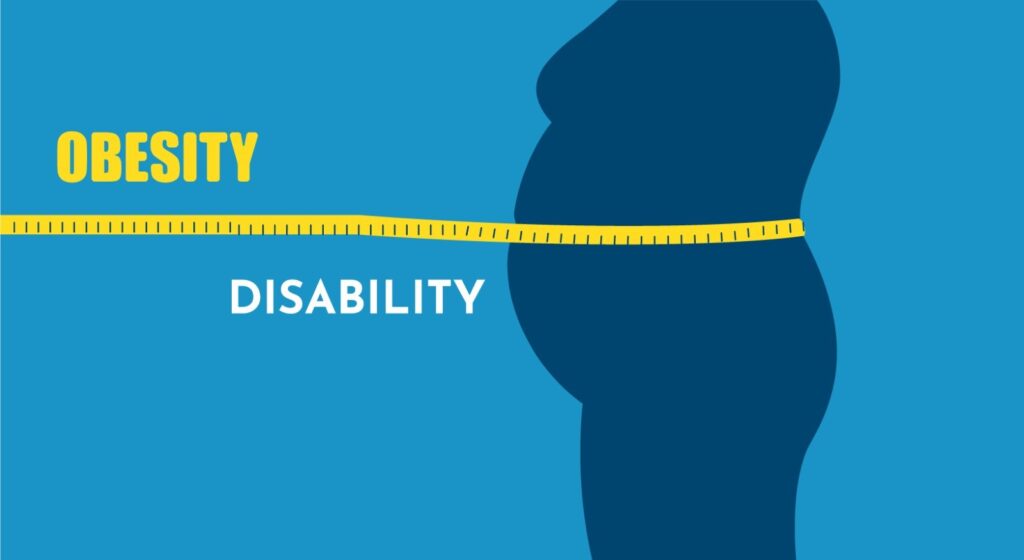
When Obesity Becomes a Disability?
Over the years, studies on obesity and disability have emerged more often than before as a subject of concern to organizations and employees. Thus, it may be useful to understand such legal subtleties as when obesity is defined as a disability in the framework of the ADA in order not to fall victim to discrimination at work. Also to know how and when employers can consider employees with obesity is defined as disabled. Thus, changing legal approaches and views that took place in modern society can be attributed to this topic and got a lot of attention. This blog talks about when obesity becomes a disability, along with its legal implications.
Understanding the ADA and Obesity
The Americans with Disabilities Act (ADA) was signed into law so as to curb discrimination against disabled persons in various facets of life including their employment. First, under the provisions of the ADA, a condition had to be one that was severely limiting at least one major life activity for a person to be considered to have a disability. However, changes were made in 2008 expanded the list so that more people could fall under the protection of the Act. Among the questions that arose one of them is, “When obesity becomes a disability?”
The answer can be found in the change of the legal environment. Since the onset of the ADA protections, the courts, specifically the employers have wrestled with the question to determine if obesity, especially the extreme forms of it, can be qualified to be a disability. ADA dictates that for a condition to fall under the disability category, then it has to be realized through a physiological disorder. This criterion has been rather important in the recent court rulings.
Legal Precedents and Interpretations
In the beginning of its development, some federal trial courts recognized the fact stating that most often extreme obesity can be considered as an impairment under the ADA regardless of its physiological background. But, when these cases are moved to appellate courts, a general understanding begins to form of how they will be handled. Another recent one was the Richardson v. Chicago Transit Authority, and four courts of appeals now agree that obesity is an ADA impairment only if it is based on a physiological condition.
First, in Richardson v. Chicago Transit Authority, the court looked at the matter of a bus driver who was fired for violating company policy on weight where the weight exceeded the limit needed to safely operate a bus. He says that his extreme obesity made him a person with a disability under the ADA. But the court denied him this arguing that the ADA was a discrimination law, not a public health law.
This decision was important because it fitted the incremental trend of the judicature’s ‘reasonable’ opinion that obesity may well be regarded as a disability only if manifested as a ‘physiological condition’. Therefore, the court also considered probable consequences of categorization of obesity as such which concerns practically half of American adults. This is because a large class of tasks may generate soft, unrealistic and impracticable expectations among employers.

Implications for Employers and Employees
As observed from the case laws there has been some guidance, but employers are not completely out of the woods yet. However, the management should note that obese employees can still be considered disabled if they can show that the obesity is due to something physiological. Also, other associated medical complications including diabetes, heart ailments or joint illnesses can create a disability context making employers abide by the provision of accommodation.
But the employers must also be very careful about their impressions and prejudices as well. The ADA covers people with regards to disability even if the person perceives as though, they are not disabled. This implies that prejudices and discrimination against overweight individuals can cost employers legally. This will help avoid stereotyping in employment decisions and increase the employment of disabled persons.
The Role of Employers in Addressing Obesity
Thus, while the legal situation appears clear, employers must stay aware of the matter. However, the majority would agree that obesity itself is not a disability. An employee who is obese can still claim unfair dismissal, if his or her obesity is associated with any other illness, or if the employee is regarded as one with a disability. Employers should make sure that the policies and decisions they make in the workplace do not exclude obese employees. Reducing possible legal is another rationale for ensuring reasonable accommodations and an inclusive work climate.
Proactive Measures for Employers
There is a need for employers to take action in dealing with obesity and its related disorders in the workplace. This entails a process of offering frequent training on ADA compliance, admitting new workers inclusively without discriminating against them, and adopting non-discriminatory policies. Employers should also consider offering other wellness programs that support healthy lifestyles for employees while for those with an obesity issue, employers should also support them. In this manner, legal ramifications can be kept to a minimum while employers foster a friendly climate that allows workers to present themselves in public domains.
Diagnose and Cure Obesity at Direct Preventive Care
Therefore, to fully assess when obesity becomes a disability, it is necessary to analyze previous and subsequent ADA case law. Hence, despite the courts making it clear that obesity is a disability, it is an underlying medical condition, and employers must be more cautious. Direct Preventive Care aims to enhance life expectancy by promoting early intervention in health complications and providing a weight management program. Our knowledgeable experts weed out the causes of the diseases as well as the symptoms helping in weight loss. Transform your health management for the better with our personalized care solutions.














